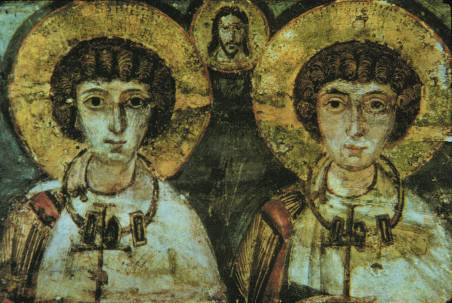Last week the US Supreme Court legalized gay marriage. It was an amazing victory for equality and a long time coming. There were, however, dissents. Chief Justice John Roberts wrote:
[T]he Court invalidates the marriage laws of more than half the States and orders the transformation of a social institution that has formed the basis of human society for millennia, for the Kalahari Bushmen and the Han Chinese, the Carthaginians and the Aztecs. Just who do we think we are?
Roberts’ dissent is a version of the appeal to authority fallacy, with his authority here being the supposed constancy of monogamous heterosexual marriage throughout time.
On the other side of things, several media outlets began posting articles about how, in fact, gay marriage had been practiced a millennium ago by various sects of Christianity with a rite called adelphopoeisis. Two saints, Sergius and Bacchus (pictured below) were probably the highest-profile pair to undergo the rite which formalized and sanctified their relationship.
The articles on adelphopoeisis as an early gay marriage rite went back to one historian, John Boswell, who claimed that it sanctified homosexual unions. Other historians contest Boswell’s claim, and claimed that adelphopoeisis was more of a brotherhood ritual.
In this episode, I take the position that ultimately it does not matter what the nature of adelphopoeis was, and that it is also perfectly acceptable to contravene the traditions that John Roberts held so dear. The rightness of legalizing gay marriage does not rest upon what our ancestors did or did not do, but the future that modern people choose to make.
Popular history sites like io9 and Cracked republished and re-posted their articles that had previously referenced adelphopoeisis.
John Boswell’s obituary in the New York Times.
More on appealing to history or tradition as a logical fallacy.
Podcast: Play in new window | Download
Subscribe: RSS
